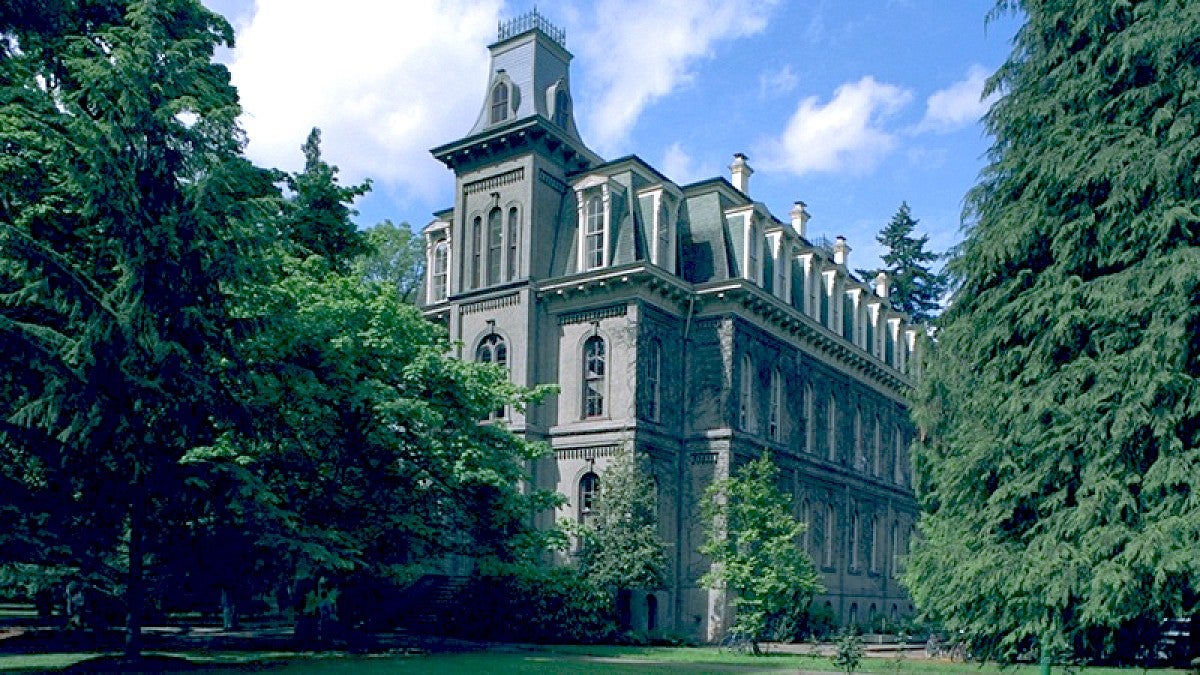The University of Oregon Board of Trustees voted unanimously to remove the name of Matthew Deady from the university’s oldest building due to the racist views he held.
The building will be temporarily renamed University Hall while UO President Michael Schill identifies a process for permanently renaming it.
The board took the action at a special meeting June 24, following a call from UO trustee Andrew Colas for the board to revisit an issue the university community has wrestled with in recent years. Deady served as the first president of what was then the UO Board of Regents, starting in the 1870s.
“I want to acknowledge the board and President Schill for listening, taking the time to understand the importance of the issue and for their decisive action,” Colas said. “This is the first step of many for the University of Oregon to strengthen and support diversity and inclusion on our campus.”
“My goal is for the UO to become a national leader and model for other universities' intentional investment in the success of Black students, and I am encouraged by the commitment I see from our community to that end,” he added.
UO students and others renewed their call for the building to be renamed in the wake of the recent death of George Floyd at the hands of Minneapolis police, a tragedy that has prompted nationwide protest. The UO’s Black Student Task Force first demanded that the building, and a separate residence hall, be renamed in 2015.
Schill had earlier recommended against the name change, due the evolution of Deady’s views in the later stages of his life and his extensive public service during Oregon’s early years. But he said continued violence against Black Americans by police, the disproportionate effects of COVID-19 on people of color and accelerating racial inequality “have pushed us over a tipping point” and prompted him to reconsider.
“It is now apparent to me that, as long as Matthew Deady’s name remains in a place of honor on our campus, our students of color will feel that they are not valued; that this institution is not their institution,” Schill wrote in a campus message.
Trustee Ginevra Ralph said she didn’t believe the board’s action would either eliminate or rewrite history.
“It can neither erase Judge Deady nor any of his actions,” she said. “But this action does add to the ever-evolving history of the University of Oregon, and it is an important symbol of the changes we must effect to create an equitable and inclusive society.”
Student trustee Katharine Wishnia said there was no acceptable reason to leave Deady’s name on the building.
Deady’s “racist beliefs are an inherent part of his politics and roles,” she said. “We cannot just choose to separate what we want of Matthew Deady and what we want Deady Hall to represent.”
Trustee Joseph Gonyea thanked Colas for continuing to educate the board on the negative impacts of leaving Deady’s name in place.
“I’ve thought differently in these changing times,” he said. “I hope this step today will be one small step where we think globally and act locally and make a meaningful change at the University of Oregon.”
Schill said the university plans to take a number of additional steps to combat racism and support diversity and inclusion on campus.
Among those, Schill is expanding the charge of an existing campus committee to consider whether any campus statues or monuments should be removed. University leaders will also look for concrete steps to bolster the recruitment of African American students and faculty members and provide them with additional support on campus, Schill said.
In addition, Schill noted that he looks forward to Colas taking a leadership role among a group of stakeholders who can help move ideas for strengthening and supporting the UO’s Black community.
“As a university, we can play a very important role in creating societal change,” Schill said. “And it will take the effort of current and future students, faculty and staff to continue along this path to a better world.”
—By Saul Hubbard, University Communications


